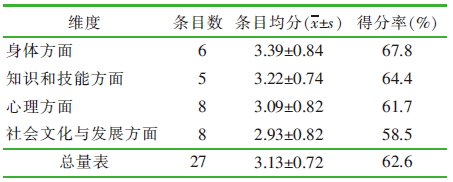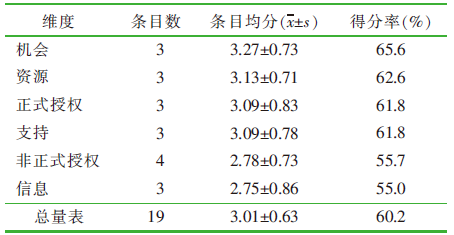| [1] |
Duchscher JE. Transition shock:the initial stage of role adaptation for newly graduated registered nurses[J]. J Adv Nurs, 2009, 65(5):1103-1113.
doi: 10.1111/j.1365-2648.2008.04898.x
pmid: 19183235
|
| [2] |
Walker A, Costa BM, Foster AM, et al. Transition and integration experiences of Australian graduate nurses:a qualitative systematic review[J]. Collegian, 2017, 24(5):505-512.
doi: 10.1016/j.colegn.2016.10.004
|
| [3] |
Goode CJ, Reid Ponte P, Sullivan Havens D. Residency for transition into practice:an essential requirement for new graduates from basic RN programs[J]. J Nurs Adm, 2016, 46(2):82-86.
doi: 10.1097/NNA.0000000000000300
|
| [4] |
Laschinger HK, Finegan J. Empowering nurses for work engage-ment and health in hospital settings[J]. J Nurs Adm, 2005, 35(10):439-449.
doi: 10.1097/00005110-200510000-00005
|
| [5] |
Sarmiento TP, Laschinger HK, Iwasiw C. Nurse educators’ workplace empowerment,burnout,and job satisfaction:testing Kanter’s theory[J]. J Adv Nurs, 2004, 46(2):134-143.
pmid: 15056326
|
| [6] |
Spence Laschinger HK, Wilk P, Cho J, et al. Empowerment,engagement and perceived effectiveness in nursing work environments:does experience matter?[J]. J Nurs Manag, 2009, 17(5):636-646.
doi: 10.1111/jnm.2009.17.issue-5
|
| [7] |
李慧芬, 姜连英, 王超, 等. 新入职护士转型冲击与工作投入的相关性分析[J]. 长春中医药大学学报, 2019, 35(6):1184-1187.
|
|
Li HF, Jiang LY, Wang C, et al. Relationship of transition shock and work involvement for newly-graduated nurse[J]. Journal of Changchun University of Chinese Medicine, 2019, 35(6):1184-1187.
|
| [8] |
薛友儒, 林平, 高学琴, 等. 新护士转型冲击评价量表的编制及信效度检验[J]. 中华护理杂志, 2015, 50(6):674-678.
|
|
Xue YR, Lin P, Gao XQ, et al. Development and the reliability and validity test of the transition shock of newly graduated nurses scale[J]. Chin J Nurs, 2015, 50(6):674-678.
|
| [9] |
罗兰, 刘思维, 陈阳广, 等. 新护士生涯适应力对其转型冲击的影响[J]. 中华现代护理杂志, 2016, 22(21):2971-2974.
|
|
Luo L, Liu SW, Chen YG, et al. Impact of career adaptability on their transition shock for newly graduated nurses[J]. Chin J Mod Nurs, 2016, 22(21):2971-2974.
|
| [10] |
Laschinger HK. A theoretical approach to studying work empowerment in nursing:a review of studies testing Kanter’s theory of structural power in organizations[J]. Nurs Adm Q, 1996, 20(2):25-41.
pmid: 8700383
|
| [11] |
贾涛. 工作授能对临床护士自我效能和工作控制感影响的研究分析[D]. 成都:四川大学, 2007.
|
|
Jia T. Investigation of the influencing effect of work empowerment on clinical nurses’ self-efficacy and job-control[D]. Chengdu:Sichuan University, 2007.
|
| [12] |
王旭. 锦州市三甲医院护理人员工作压力现状及影响因素调查[J]. 锦州医科大学学报, 2017, 38(2):82-84.
|
|
Wang X. Investigation on current situation of job stress and influencing factors of nurses in third-grade class-A hospital in Jinzhou[J]. J Jinzhou Med Univ, 2017, 38(2):82-84.
|
| [13] |
Regan S, Wong C, Laschinger HK, et al. Starting out:qualitative perspectives of new graduate nurses and nurse leaders on transition to practice[J]. J Nurs Manag, 2017, 25(4):246-255.
doi: 10.1111/jonm.2017.25.issue-4
|
| [14] |
Duchscher JB, Windey M. Stages of transition and transition shock[J]. J Nurses Prof Dev, 2018, 34(4):228-232.
doi: 10.1097/NND.0000000000000461
pmid: 29975318
|




